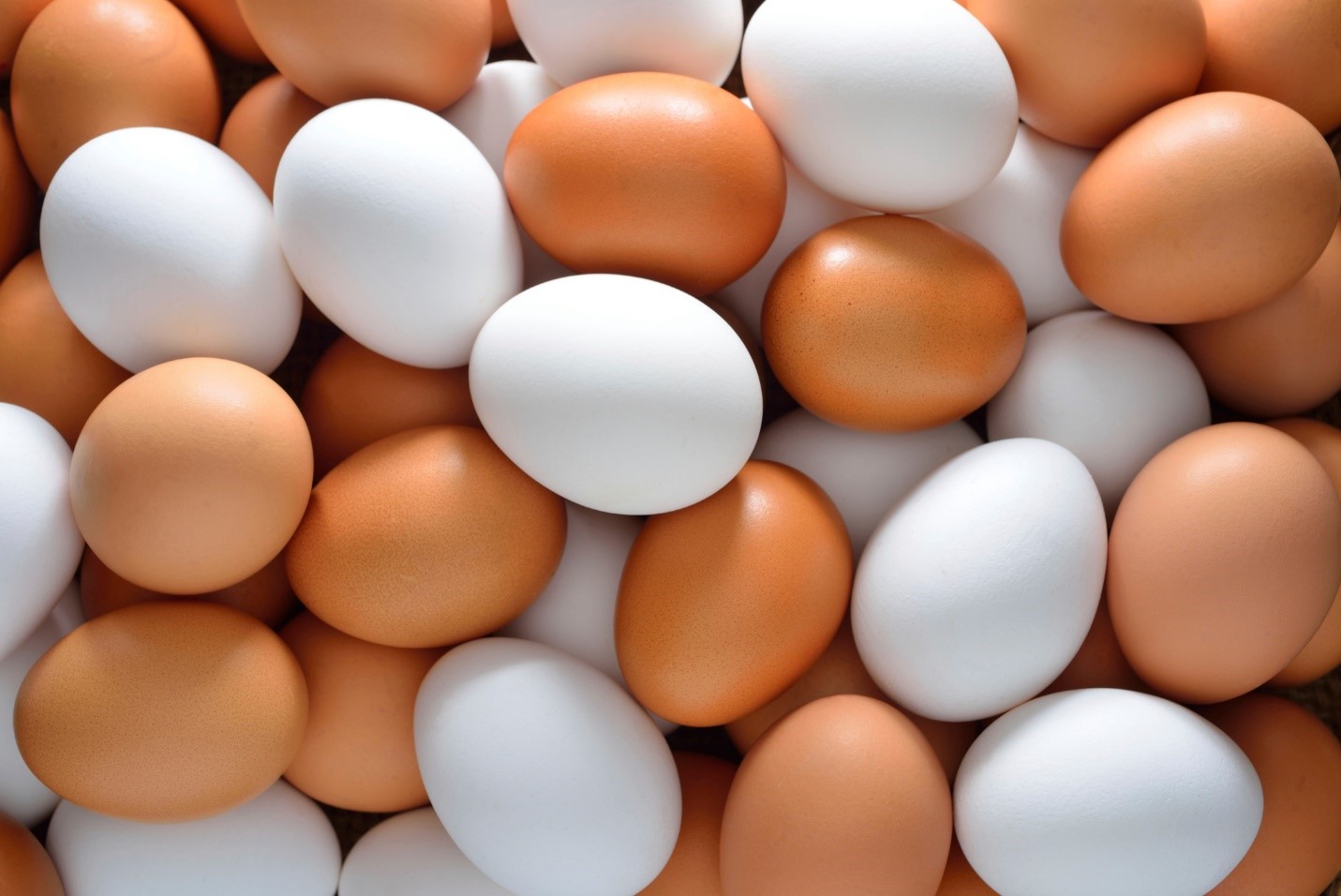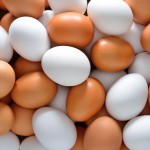
by sbouie | Mar 14, 2016
This is the time of year when people hear “Easter,” they think of Easter egg hunt. Eggs can be used for more than just an Easter Egg Hunt, although Easter is when you can purchase eggs at their lowest price.
eggs at their lowest price.
While eggs often are eaten for the protein value, they also contain other nutrients. Eggs provide vitamin A, riboflavin, minerals, and other vitamins. The yolk contains saturated fat and cholesterol, which is a concern for those with high cholesterol.
There is a vast variety of egg substitutes* on the market if you need to avoid the cholesterol. Some examples are:
o Egg whites ®
o Egg Beaters ®
o No eggs ®
o Egg Replacer ®
o Vegan Egg Replacer ®
o Gluten-free Egg Substitute ®
Why eggs? Because they are healthy – whether you select the real thing or a substitute.
*The use of trade names in this article is solely for the purpose of providing specific information. UF/IFAS does not guarantee or warranty the products named, and references to them in this article does not signify our approval to the exclusion of other products of suitable composition.

by jbreslawski | Mar 11, 2016
 It seems that everywhere you look, an egg hunt is being advertised, egg dye kits are on every corner in the store, and the Internet is a-buzz with cool decorating ideas. Keep in mind this season that this fun family activity could turn rotten if you forget food safety.
It seems that everywhere you look, an egg hunt is being advertised, egg dye kits are on every corner in the store, and the Internet is a-buzz with cool decorating ideas. Keep in mind this season that this fun family activity could turn rotten if you forget food safety.
Outbreaks of foodborne illness, especially salmonella, have been associated with the improper preparation and storage of eggs. Salmonella is not something you want to remember when you think back to memories of decorating and hunting eggs in the spring.
Common symptoms of salmonella include nausea, vomiting, abdominal cramps, diarrhea, fever, and headache. Children are one population most susceptible to foodborne illness.
There is no reason to worry about potential food safety hazards associated with your holiday eggs as long as you remember to follow these guidelines:
- Clean and sanitize your hands, preparation area, and utensils before, during, and after the cooking process.
- Use eggs that are clean and free of cracks and leaks.
- Cook eggs completely – no rushing or short cuts. If you don’t have the time, pick another day to do it.
- Use only food-grade dyes; these include food coloring and dye sold in egg dye kits. Use beet juice, blueberry juice, etc. as alternatives to artificial dye.
- Refrigerate eggs as soon as you are finished decorating or, if decorating later, after cooking and drying.
- The refrigerator door is the warmest spot in your fridge; store eggs in the carton in the main compartment, not in the door.
- Toss eggs that have been out of the refrigerator for more than 2 hours. If eggs are not “found” or eaten, within this time, make the sacrifice and throw them away (of course, do this while the kids aren’t looking.)
- When hiding eggs for a hunt, keep them in areas that are clean, free of dirt, and away from pets or pests. Consider decorating one set for hunting and another for eating.
- Hard-boiled eggs are safe for up to one week with proper cooking, storing, and handling procedures.
Keep these guidelines in mind for an “egg”cellent holiday with family, friends, and fun!
by Dorothy C. Lee | Mar 17, 2015

Egg food safety at Easter time
Easter activities often include eggs. During the Spring holiday, eggs are both a decorative craft object and an inspiration for springtime fun and games, and, oh by the way, they are fun to eat too.
Eggs and egg products can be an important part of your diet. Although there are many myths and misconceptions about how to safely cook and handle eggs, all it really requires is care. By following a few simple guidelines, eggs and egg products can play a valuable and economic role in your holiday menu.
To avoid the possibility of foodborne illness, fresh eggs must be handled carefully. Even eggs with clean, uncracked shells may occasionally contain bacteria called Salmonella that can cause an intestinal infection. The U.S. Food and Drug Administration (FDA) is working to prevent this problem in eggs by requiring that egg producers obtain chicks that are certified Samonella-free, that the hens are kept in houses that are free from rodents and other Salmonella carrying sources, that the houses are continually tested for Salmonella, and that the eggs are stored at temperatures that retard Salmonella growth. Consumers play a large role in this prevention strategy. In fact, the most effective way to prevent egg-related illness is by knowing how to buy, store, handle and cook eggs—or foods that contain them—safely.
Following these instructions is important for everyone, but especially for those most vulnerable to foodborne disease—children, the elderly, and persons with weakened immune systems.
Buy Right
- Buy eggs only if sold from a refrigerator or refrigerated case.
- Open the carton and make sure that the eggs are clean and the shells are not cracked.
- Refrigerate promptly.
- Store eggs in their original carton and use them within 4 to 5 weeks.
Keep Everything Clean
Before preparing any food, remember that cleanliness is key!
- Wash hands, utensils, equipment, and kitchen work surfaces with hot, soapy water before and after they come in contact with eggs and egg-containing foods.
Cook Thoroughly
Cook eggs thoroughly. Thorough cooking is perhaps the most important step in making sure eggs are safe.
- Cook eggs until both the yolk and the white are firm. Scrambled eggs should not be runny.
Serve Safely
Bacteria can multiply in temperatures from 40°F (5°C) to 140°F (60°C), so it’s very important to serve foods safely.
- Serve cooked eggs and egg-containing foods immediately after cooking.
- For buffet-style serving, hot egg dishes should be kept hot, and cold egg dishes kept cold.
- Eggs and egg dishes, such as quiches or soufflés, may be refrigerated for serving later but should be thoroughly reheated to 165°F (74°C) before serving.
Chill Properly
- Cooked eggs, including hard-boiled eggs, and egg-containing foods should not sit out for more than 2 hours. Within 2 hours, either reheat or refrigerate.
- Use hard-cooked eggs (in the shell or peeled) within one week after cooking
On the Road
- Cooked eggs for a picnic should be packed in an insulated cooler with enough ice or frozen gel packs to keep them cold.
- Don’t put the cooler in a hot car—carry it in the air-conditioned passenger compartment of the car.
Safe Handling Instructions
To prevent illness from bacteria: keep eggs refrigerated, cook eggs until yolks are firm, and cook foods containing eggs thoroughly.
Hard-cooked Easter eggs can help stretch your food dollars. Packed with high-quality protein, vitamins, and minerals, they add good nutrition when included in casseroles, sandwiches, and salads. Remember, hard-cooked eggs should be refrigerated as much as possible between cooking, decorating, and the hunt or the display.
However they are used, eggs are delicious, nutritious, and economical.
For further information, contact
Dorothy C. Lee, C.F.C.S.
Family & Consumer Sciences Agent
UF IFAS Extension Escambia County
(850) 475-5230
dclee@ufl.edu
by Judy Corbus | Mar 25, 2013

Dye one set of eggs for hiding and another set for eating.
If an Easter egg hunt is on your calendar for the holiday weekend, follow these tips for safe, quality hard cooked eggs. Dr. Amy Simonne, University of Florida/IFAS Food Safety Specialist, recommends choosing Grade A or AA eggs with clean, uncracked shells. Store eggs in the carton in the main compartment of the refrigerator, not the door, to maintain freshness. It is not necessary to wash eggs before coloring but inspect and discard any that are unclean, cracked, broken, or leaking.
To prepare hard cooked eggs, place eggs in a single layer in a saucepan. Add enough tap water to cover eggs by at least one inch. Cover and quickly bring just to boiling. Turn off heat and, if necessary, remove the pan from the burner to prevent further boiling. Let eggs stand, covered, in the hot water about 18 minutes for extra-large eggs, 15 minutes for large eggs, and 12 minutes for medium eggs. Immediately run cold water over eggs or place them in iced water until completely cooked. To remove shell, crackle it by tapping gently all over. Roll egg between hands to loosen shell. Peel, starting at the large end. Hold egg under running cold water or dip in a bowl of water to help ease off the shell. Eggshells usually come off much more easily, without tearing the whites, when they are in small pieces rather than large chunks. Very fresh eggs may be difficult to peel. The fresher the egg, the more the shell membrane clings to the shell. For best results, buy and refrigerate eggs seven to ten days before hard cooking. This brief “breather” allows the eggs to take in air, which helps separate the membrane from the shell.
When coloring eggs, use only food-grade dyes or natural color from vegetables such as beets, cranberries, and blueberries. Hard-cooked eggs will keep in the refrigerator for one week. Like leftover turkey at Thanksgiving, colored eggs are great for sandwiches, either sliced or in egg salad.
Since eggs receive a lot of handling during a hunt, cracks are common. This allows bacteria from hands and the hiding places to seep through the shell, contaminating the inside. After the hunt, discard any with cracked shells. Discard also any eggs that have been out of the refrigerator for more than two hours. Re-refrigerate the “found” eggs until they are eaten. To reduce the risk of foodborne illness, consider coloring one batch for hunting and another for eating. An even safer option is to use plastic eggs for your hunt. For more fun, add a candy or trinket surprise inside each egg.
Be careful when preparing dishes calling for raw eggs. Many recipes for bunny-shaped cakes call for using a raw egg white in the frosting. However, this poses a risk for salmonella food poisoning. To be safe, use a frosting recipe that uses hot syrup and egg white. If the egg white mixture reaches 160 degrees F on a thermometer, it should be safe. You also may be able to use a pasteurized powdered meringue available where cake decorating supplies are sold.
Sources: FAR8702 Egg Safety, Dr. A. Simonne, University of Florida/IFAS Extension.
Traditional Spring Food: Its History and Safe Handling Today, L. Fox, USDA.
Egg Tips for Easter, Muriel Turner, University of Florida/IFAS Extension.

 eggs at their lowest price.
eggs at their lowest price.



